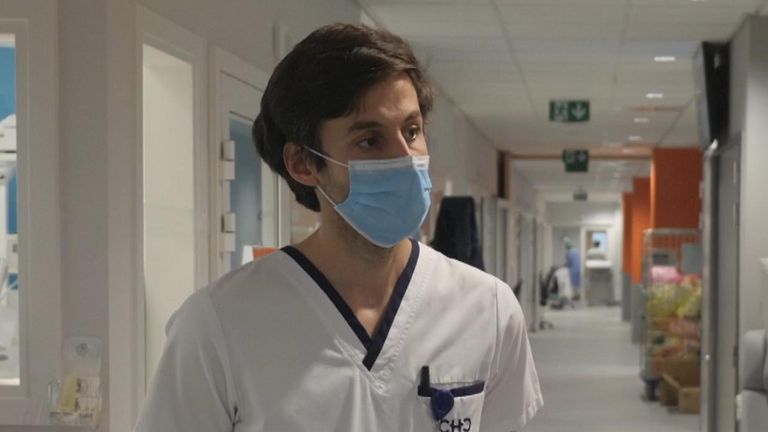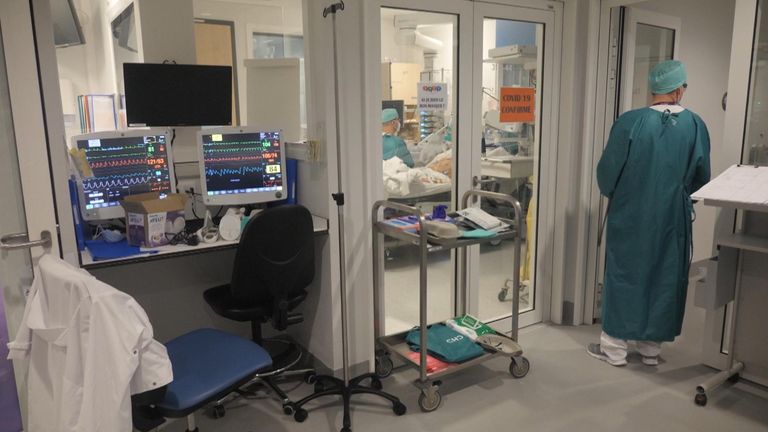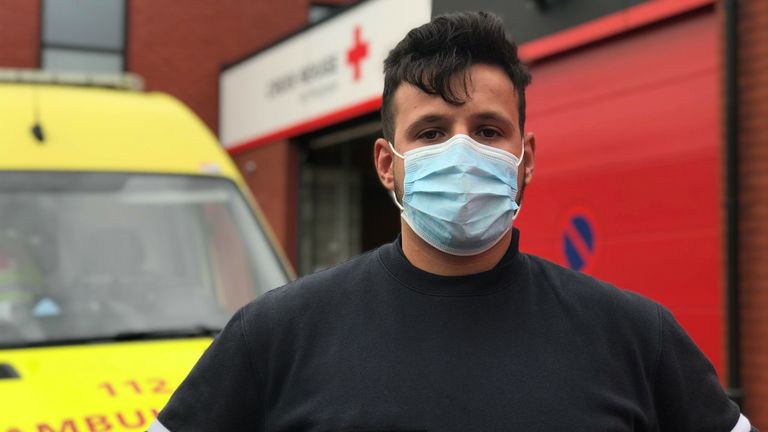An intensive care specialist in Belgium’s worst-hit COVID-19 region has told Sky News he fears the moment when the hospital is full and he has to choose who will live and who will die.
Dr Laurent Jadot says the situation has become so bad that many people are now calling it “the new Lombardy”, in reference to the part of Italy which suffered the most during the first wave of the pandemic crisis.
He works at CHC Montlegia, which has one of the largest intensive care units in the city of Liege at the heart of the southern region of Wallonia – where hospitals are struggling to cope with the number of coronavirus patients.
All the beds currently set aside for COVID-19 patients on the unit are full, and Dr Jadot says he fears having to make agonising decisions.
“What I fear is the moment when the hospital is full of patients and we have to choose which patient is able to survive and which patient is not,” he told Sky News.
“Actually when I’m in my bed, when I am thinking about that, that’s what I don’t want.”
On glass door after glass door in the corridor where we talk, there are large orange signs saying “COVID Confirmed”.
Inside each room we see the patients attached to ventilators, lying on their stomachs to help them breathe.
Or in the case of one young patient in their 20s, sitting upright in a chair.
As we pass one room, we see an agonising scene.
A patient is close to death. Family members press their faces to the window as their loved one passes away, unable to be in the room in those final moments.
Dr Jadot says many more families will go through the heartbreak of COVID-19. Cases are rising fast across the generations.
“In Liege, there are up to 25% of positive tests currently for all people who come to be tested,” he said.
“So one in four tests is positive. And therefore, in view of the rate of contamination over the last two or three weeks, we know that we are bound to have a wave of hospitalisations to what we are seeing in contamination figures.”
He says more ICU beds will have to be created, but like in other hard-hit cities across Europe, finding nurses and medical staff to help cope will be a major pressure.
Belgium’s health minister has warned the country is approaching a “tsunami” of COVID-19 – and a point may come when the government is unable to control what is happening.
All of which will sound alarm bells for the UK, which is a few weeks behind Belgium when it comes to coronavirus.
Health Secretary Matt Hancock has cited Belgium as a model to look to for its handling of the virus.
But it is now seeing 10,000 cases a day and the health professionals are scared of what may be in front of them in the coming weeks.
At an ambulance station in Liege, Red Cross paramedics disinfect their vehicles after transporting suspected COVID-19 patients to hospital.
The teams are operating COVID-only ambulances to help with pressure on the health service.
One paramedic, Luca Amato tells us they are seeing more younger patients in this second wave of COVID, including children. The current situation makes him very worried.
He said: “Our main concern is this influx of people that we’ve been seeing for about a week. It has doubled or even tripled. This is proof that this influx continues and that we are in under extreme conditions.”
He is pessimistic that recent restrictions in Belgium, including a night-time curfew and limits on social contact, will make enough of a difference.
“Unfortunately nothing can be done about it and I think it will continue. It’s these worries that are the first thoughts that enter our heads,” he added.
Those worries are shared by medical staff in hospitals across Wallonia. They are bracing themselves for how that will translate into hospital admissions in the coming weeks.




